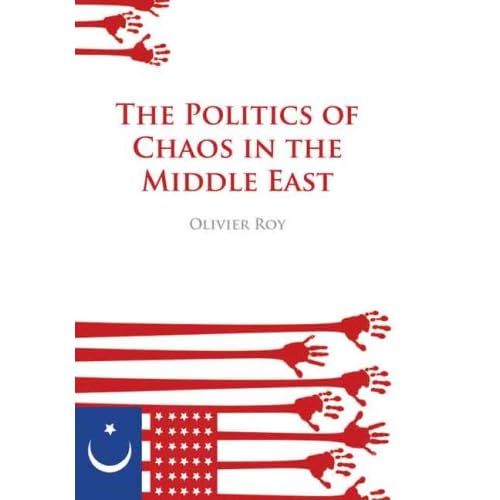
Spiked Review of Books looks at the new book by Olivier Roy, The Politics of Chaos in the Middle East.
Here is a rather long passage from the review, written by Philip Cunliffe.
In terms of Iraq, Roy points out that the failed adventure there is not simply a ‘hare-brained scheme that has fizzled out.’ Underpinning the disaster is an influential doctrine of intervention and democratisation shared by all the leading developmental institutions, both intergovernmental and non-governmental. Its assumptions are: ‘Distrust of existing governments, encouragement of civil society, the development of microprojects, and the central importance of women’s and gender issues, advocacy of the humanitarian approach.’ These ideas grow directly out of influential leftist theories about the ‘duty to intervene’ in other societies to enforce democracy. Existing governments are to be drubbed into submission (with bombs if necessary), and then some new political institutions are quickly thrown up, with little concern as to whether the new institutions have any legitimacy or roots in those societies. Hence the ridiculous outcomes, which would be comedic if they were not so tragic: Roy gives the example of Afghan village committees that are forced to follow gender equality guidelines that would make a Scandinavian Social Democrat blanche.
Using his distinctive vantage point, Roy effortlessly punctures one myth after another. So while leftists imagined that oil pipelines would spontaneously spring up from beneath the GIs’ boots, Roy shows that the oil lobby was cool on the invasion of Iraq. Unlike the imperialist corporations of yesteryear, Roy argues that today’s oil corporations are not interested in controlling oilfields directly. As long as no single country monopolises supply, the energy companies are happy to rely on the market to set prices and regulate production. On the other hand, Roy says that the civil engineering sector and service companies supported the war, because unlike the oil companies, they work on short-term contracts that do not require any long-term strategy and they are paid for by the Western taxpayer (meaning they have no need to cultivate stable relations with foreign governments).
The main myth that Roy wants to cut down in his book is the idea of a monolithic Islam confronting the West. For a start, if Iraq survives in any viable national form, it will be a Shia-dominated state, which will give the religious schism between Sunni and Shia an enduring new geopolitical significance in the region. More profoundly, Roy shows that the rhetoric of the ‘global war on terror’ collapses together four distinct spheres of Islamised politics, each with their own specific logic: al-Qaeda-style terrorists; Islamists proper (those who try to build Islamic political institutions); fundamentalists who want to live under sharia law; and the cultural conservatives who advocate communal autonomy under multiculturalism. None of these represent an existential threat.
Despite its bloody ostentation, al-Qaeda’s violence has no strategic orientation that would allow it to give purpose or political direction to its activities, with no lasting institutions or political roots. While Islamist movements have more political traction, they also run up against their limits: the failure of the Islamist political model in regimes such as Iran, Sudan and Afghanistan, and the fact that they must consistently push beyond an Islamist agenda in order to maintain political momentum in any national arena. Roy observes: ‘It is clear that the Palestinians who voted for Hamas in 2006 did not do so because they wanted the destruction of Israel or sharia, but because they wanted good governance, like the Iranians who supported Ahmadinejad in the second round of the Iranian presidential elections in 2005.’
Western states’ inability to establish political gradations between different types of Islamised politics leads directly to impotence: ‘There is not the military capability to attack on all fronts: it is not possible simultaneously to wage war on al-Qaeda, the Taliban, Hezbollah, Hamas, Syria and Iran (and the Muslim Brotherhood, veiled women, inner-city imams, etc).’ Or, more pithily: ‘Moral intransigence leads to impotence if based on a non-political definition of evil.’
As a result of such insightful analysis, Roy’s book is head and shoulders above much of the standard commentary on the Middle East, Islamism and al-Qaeda. Indeed, the main problem with the book is that it does not go far enough in pursuing this trope of the ‘politics of chaos’. Roy draws attention to the fact that the real dynamic driving political and social evolution in the Middle East is not Islam, but deeper under-currents of national rivalries and uneven processes of state-led modernisation in poor and traditional societies. This emphasis provides a rigorous, scientific counterbalance to the nonsensical depictions of the Middle East as a cauldron of fanaticism.
Read the whole review.
No comments:
Post a Comment